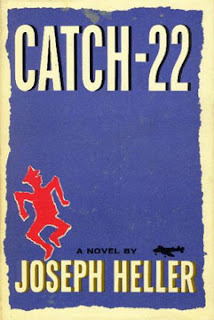
Dr. Strangelove really reminded me of Joseph Heller's Catch-22, a novel I had to read, write about, and present on in my senior year of high school. I really used my ideas on the novel to help form my perceptions of this movies, so I hope none of you mind if I take some time to draw some comparisons.
Like Dr. Strangelove, Catch-22 is satirical and full of dark humor-- Heller wrote it in a style that would emphasize the absurdity of mankind and war. The 'catch-22' within the novel is that the main character, Yossarian, a WWII bombardier, wants permission to end his duties flying in the war. He is constantly told that the only people who are allowed to stop flying are 'crazy' people, and the only ones considered 'crazy' are those who truly want to keep flying. There are an overwhelming amount of characters within the novel, something meant to emphasize the absurdity and confusion of war by making the reader feel truly confused themselves. Like Kubrick's characters, Heller's are given comical and bizarre names-- like General Scheisskopf (translates to shithead in German), Major Major Major Major, and Milo Minderbinder, just to name a few.

Drawing comparisons between Heller's novel and Kubrick's film makes me really think about WHY dark humor and satire work so well in this kind of anti-war pieces. I really liked the portion of our article in class that discusses how Kubrick began writing and forming Dr. Strangelove as a serious script, but it sort of naturally began to shift toward dark humor. In a way, I feel like this is the only way media and art can effectively critique mankind and war-- to reveal absurdity through more absurdity, in comedy and satire. How else can we truthfully represent a war in which two countries built enough bombs to destroy the world, but still acted as if it was not too dangerous or risky?
Heller's work focused on the ridiculousness of WWII, Dr. Strangelove on the Cold War, and in class we were asked to think about how a writer or filmmaker might portray the current war in the Middle East similarly. This made me think of an episode of Scrubs where the characters get into a debate over being either Democrats or Republicans. Dr. Cox points out the several reasons given by American politicians to justify the war-- sometimes it's oil, sometimes terrorism, sometimes it's because of nuclear weaponry. I think this would be a good place to start on an anti-war-in-the-Middle-East satirical work-- highlighting that there was no one concrete reason for this war, but a plethora of uncertainties that politicians chose to focus on at different times in order to try to justify the crisis.
I thought Dr. Strangelove was a success as a film because it did two things really well- it made me laugh, and it also made me reflect on our country's history, the Cold War, and war in general. I think it's interesting that there is a way for media to present ideas about war that entertains but also informs, and that's why dark humor is so fitting for anti-war themes.

I think it's great that you point out the importance of the dark humor, and how the only way to make people think about the absurd things that they think is by making them more absurd. This nightmare comedy is my favorite genre because it makes you think, like you said. I have never read catch-22, but i think now i am going to go pick it up as a summer read, because these post modernist kind of themes interest me. Do you think that Dr. Strangelove can be considered post modernist?
ReplyDeleteI really enjoyed your point on the effectiveness of the dark humor. It is amazing that a film like this could show how ridiculous both of these countries were and their logic and justification of stockpiling soooo many nuclear weapons.
ReplyDeleteI actually have never read catch 22 which seems to be well liked by many people I know so I may just have to check it out.
As people above said the dark humor you talked about was a very important key factor when it came to this situation i feel. The reason i say this is because of how the new york times described the situation at the time, which would be a "dont worry about it" feel. on top of this I really liked reading about how you compared it to that episode of Scrubs. very interesting and I never thought of that episode like this film but now I can see it.
ReplyDeleteI also loved your comment about showing absurdity with even more absurdity. I think what draws me so much to satirical humor and satirical writing like Vonnegut and Salinger is that they entertain us but als odo so much more. They make us look at ourselves in a completely different way. We oftentimes don't take a step back and look at ourselves with an observant let alone critical eye and these satirical stories give us that chance.
ReplyDeleteIn regards to this film being post-modernist, while I'm still a little shaky about what the term means, there is soemthing about Strangelove that seems to be very fresh and innovative. I think it's how Kubrick decided to revolve the entire film around three locations and three sets of characters.
I think it probably does have postmodern aspects, though films that are self-consciously postmodern I associate more with the 80s. I'll talk more about it when we get that up to the 80s. Somebody remember to ask me this question again, so I can deal with it properly.
ReplyDeleteI really, really like your comparison with Catch 22, Molly. It's extremely well-taken, and a nice way of contextualizing what Kubrick is doing with all the other satirical, outraged Cold War commentaries that were happening at roughly the same time.